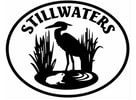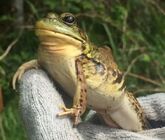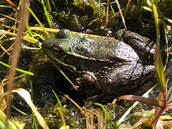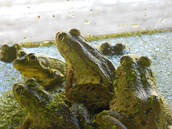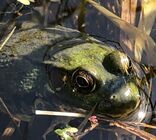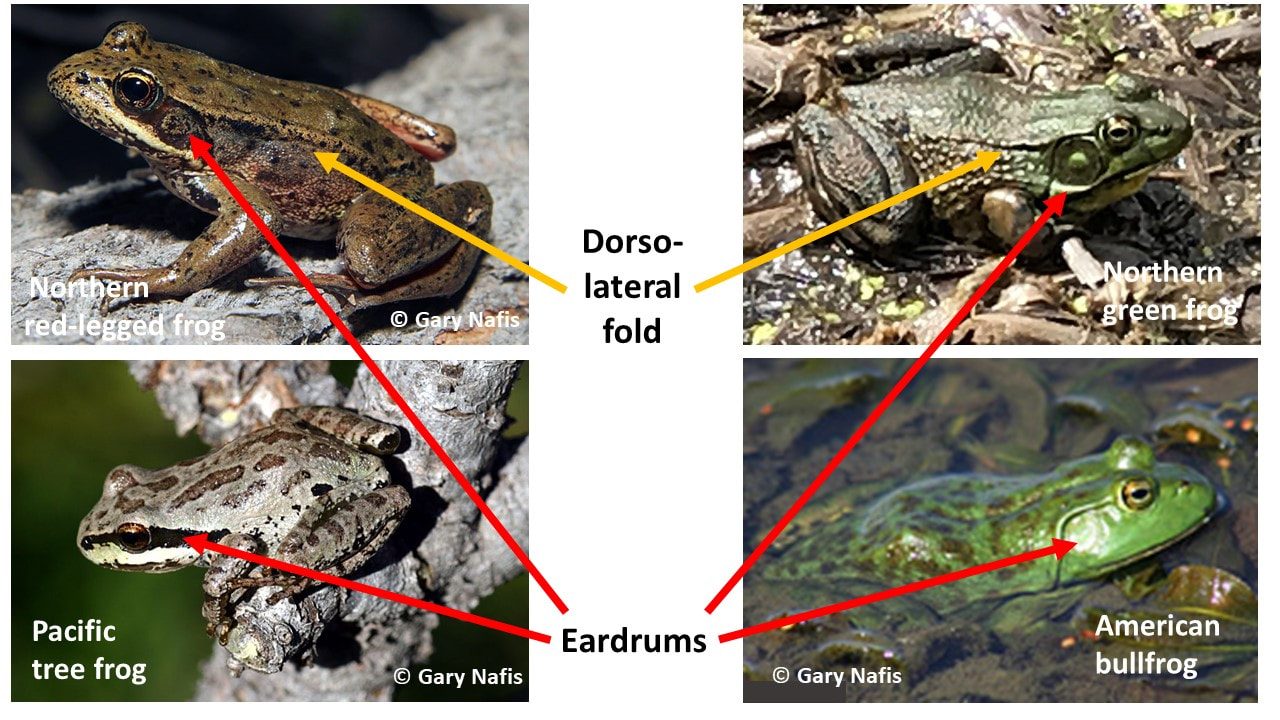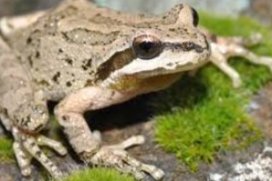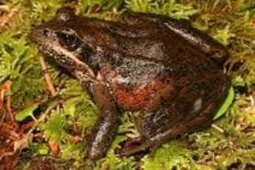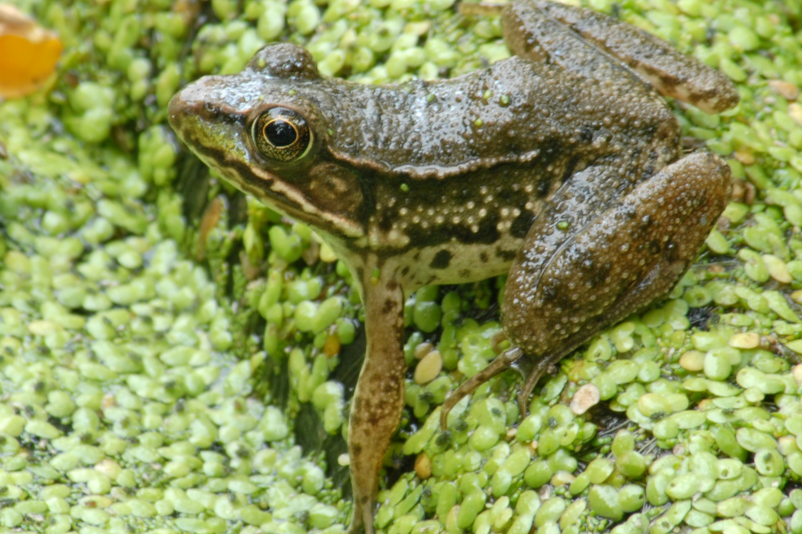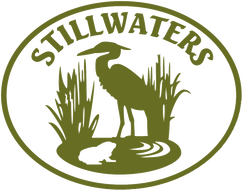Tracking Non-Native Green Frogs
Stillwaters wants to know if you see or hear non-native frogs
The chorus of male Pacific tree frogs calling for mates is one of the first harbingers of spring in Kitsap County. Native Kitsap frogs start breeding as early as January to make the most of the temporary ponds formed by winter rains.
Later in the spring, once local waters warm up, the calls of two non-native species with a different breeding strategy can be heard. The American bullfrog, Lithobates catesbeianus, has a call that sounds like a loud, deep ‘ruumm…ruumm…jug-o-rum’ whereas the green frog, Lithobates clamitans, sounds like the ‘twang’ of plucking a loose banjo string. |
This YouTube video highlights the unusual 'banjo twang' of non-native green frogs calling.
|
Unlike native tree frogs (Pseudocris regilla) and red-legged frogs (Rana aurora), bullfrogs and green frogs prefer to live and breed in permanent ponds and lakes. Because permanent water often has fish that prey on frog eggs, these species delay breeding until the water warms enough for their eggs to hatch in a matter of days rather than weeks.
Bullfrogs were introduced to the west coast more than 100 years ago as a food species and spread widely across lowland areas from British Columbia to California. How and why green frogs were introduced to the west is less clear, but there are long-established populations in southern B.C. and in Washington’s Whatcom and Stevens counties. These populations appear stable, suggesting green frogs do not spread as readily as bullfrogs - without human assistance. Green frogs in North Kitsap were first noted in Carpenter Lake in 2015 and confirmed by WDFW amphibian biologist Marc Hayes in 2019, who deemed them more likely to have arrived in Kingston via bucket than natural dispersal.
Bullfrogs’ large size, dispersal ability, and voracious appetites for anything that fits in their mouths make them a well-known threat to native wildlife. Green frogs are half the size and their ecological impacts, even where long-established, are not yet known.
To document the distribution of this newcomer to Kitsap, Stillwaters is asking the public to report where green frogs (and bullfrogs, for comparison) are seen or heard. So far, we have accounts from all along Barber Cutoff Road, the Grovers Creek Salmon Hatchery, and the North Kitsap Heritage Park.
As a critical first step in evaluating the impacts, if any, of introduced frogs, local amphibian biologist Tom Doty wants to conduct a population study of our native amphibians. He is looking for a landowner with a pond who will let volunteers put up a temporary fence to monitor the comings and goings of breeding frogs and salamanders and their offspring.
Bullfrogs were introduced to the west coast more than 100 years ago as a food species and spread widely across lowland areas from British Columbia to California. How and why green frogs were introduced to the west is less clear, but there are long-established populations in southern B.C. and in Washington’s Whatcom and Stevens counties. These populations appear stable, suggesting green frogs do not spread as readily as bullfrogs - without human assistance. Green frogs in North Kitsap were first noted in Carpenter Lake in 2015 and confirmed by WDFW amphibian biologist Marc Hayes in 2019, who deemed them more likely to have arrived in Kingston via bucket than natural dispersal.
Bullfrogs’ large size, dispersal ability, and voracious appetites for anything that fits in their mouths make them a well-known threat to native wildlife. Green frogs are half the size and their ecological impacts, even where long-established, are not yet known.
To document the distribution of this newcomer to Kitsap, Stillwaters is asking the public to report where green frogs (and bullfrogs, for comparison) are seen or heard. So far, we have accounts from all along Barber Cutoff Road, the Grovers Creek Salmon Hatchery, and the North Kitsap Heritage Park.
As a critical first step in evaluating the impacts, if any, of introduced frogs, local amphibian biologist Tom Doty wants to conduct a population study of our native amphibians. He is looking for a landowner with a pond who will let volunteers put up a temporary fence to monitor the comings and goings of breeding frogs and salamanders and their offspring.
How to Identify a Green Frog
Green frogs and bullfrogs are easily distinguished from native frog species (see Figure above) by their prominent eardrums (tympana) directly behind their eyes, larger than the eye in males and smaller in females. In native Pacific tree frogs and northern red-legged frogs, the eardrums are largely obscured by a dark mask extending backward from around the eyes. Green frogs and bullfrogs can be distinguished from one another by folds of skin that run down both sides of the back in green frogs. These dorsolateral folds are also found in red-legged frogs and is a good way to distinguish young red-legged frogs from brown-phase tree frogs (which can be brown or green) whose backs are smooth. Red-legged frogs can be greenish as well, so color is never a good identification criterion for local frogs.
Green frog calls are also very distinctive and have been described as a “banjo twang" (check out Youtube video at the top of this page), quite unlike the calls of Pacific tree frogs and bullfrogs. The red-legged frog’s call is a low “stutter” that is rarely heard unless one is practically standing on top of them; they often call underwater making it even harder for us to hear them. Recordings of calls for all frog and toad species (native or not) in British Columbia (and the Puget Sound Basin) are included in excellent fact sheets for each species available at https://www2.gov.bc.ca/gov/content/environment/plants-animals-ecosystems/wildlife/wildlife-conservation/amphibians-reptiles/amphibians-in-b-c/frogs-toads. More recordings of green frog, bullfrog and native frog calls are available onWhatcom County’s Amphibian Monitoring Program website: https://whatfrogs.wordpress.com/ and check out their ‘Species Facts’ and ‘Chasing Invasives’ pages.
Green frog calls are also very distinctive and have been described as a “banjo twang" (check out Youtube video at the top of this page), quite unlike the calls of Pacific tree frogs and bullfrogs. The red-legged frog’s call is a low “stutter” that is rarely heard unless one is practically standing on top of them; they often call underwater making it even harder for us to hear them. Recordings of calls for all frog and toad species (native or not) in British Columbia (and the Puget Sound Basin) are included in excellent fact sheets for each species available at https://www2.gov.bc.ca/gov/content/environment/plants-animals-ecosystems/wildlife/wildlife-conservation/amphibians-reptiles/amphibians-in-b-c/frogs-toads. More recordings of green frog, bullfrog and native frog calls are available onWhatcom County’s Amphibian Monitoring Program website: https://whatfrogs.wordpress.com/ and check out their ‘Species Facts’ and ‘Chasing Invasives’ pages.
